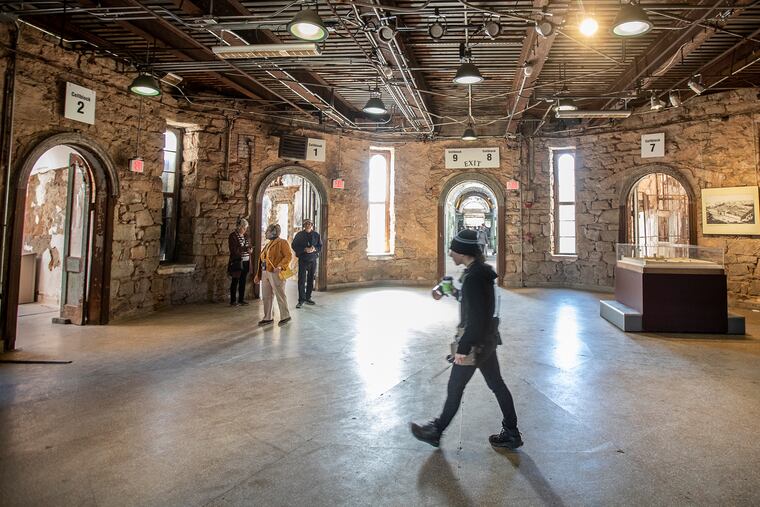These 2020 candidates will be at Eastern State next week (and the zombies aren’t invited)
It's got nothing to do with Terror Behind the Walls.

At the end of October, most of Philadelphia knows, Eastern State Penitentiary is the place that hosts zombies and ghouls and various spooky figures.
Next week, though, it will host Democratic presidential candidates. And the undead aren’t invited. (Whether it’s still spooky may depend on your political leanings.)
Several presidential candidates will appear Monday at the former prison in the city’s Fairmount section for a forum about criminal justice reform, mass incarceration, and racist policing, taking turns talking with a room of about 100 people, all of whom were either formerly incarcerated or are family members of people whose lives were shaped by the justice system.
The event isn’t open to the public, but the group holding the forum has organized watch parties across the country, including one in Philadelphia.
The town hall-style event was put together and will be moderated by Voters Organized to Educate, a national group led by formerly incarcerated people. It’s believed to be the first major conversation between presidential candidates and people affected by mass incarceration.
Three candidates — Sen. Kamala Harris (D., Calif.), Sen. Cory Booker (D., N.J.), and businessman Tom Steyer — have committed to attend the 1 p.m. event. It’s taking place three months before the Iowa caucuses, and Pennsylvania is one of the later primary states.
That two of the three candidates coming are black isn’t lost on the organizers, who plan to lean heavily on issues of race.
“Sens. Harris and Booker may have a stronger or deeper level of compassion and concern for those who have been impacted by mass incarceration because of their proximity to the African American community,” said Vivian Nixon, executive director of College and Community Fellowship, a nonprofit in New York.
» READ MORE: The horror. The haunting. The history? These days Philly Halloween attractions offer more than a good scare.
Nixon and her co-organizers said that when they were planning the event, they discussed holding it in an operational prison so the candidates could get a better sense of the true impact. But security would have been a nightmare. So they selected a former prison, Eastern State, which was among the world’s most famous and is now committed to mass-incarceration education.
But this time of year, the penitentiary isn’t known — at least to Philadelphians — for its historical tours or criminal justice programming. It’s the site of Terror Behind the Walls, the annual Halloween haunted house that the site hosts on fall evenings.
If you were hoping for Harris to be flanked by a zombie or Booker to be seated next to a gargoyle, you’re going to be sorely disappointed.
Eastern State is closing for its daytime crowd, a move it rarely makes, although the moneymaking Terror Behind the Walls is always closed Monday. The candidates will be in the center surveillance hub, the middle area of the penitentiary where all the cell blocks meet. And they won’t see any Halloween props, which are elsewhere on the site, said Sean Kelley, senior vice president and director of interpretation at Eastern State.
They won’t even see the gargoyles that used to sit on the front of the building, which were for years the only Halloween prop visible to daytime visitors — coincidentally, this was the first year they weren’t put up. Eastern State has worked over the years to separate its daytime programming from Terror Behind the Walls, which runs from September through November.
What the candidates will see is the museum’s Big Graph, a 16-foot tall exhibit on the prison baseball field that breaks down the massive growth of incarceration rates in the United States, how those rates compare to those in other countries, and the racial breakdown of the prison population.
The emphasis on these high rates of incarceration is in line with strategies Eastern State adopted in 2012 to not only show the history of the prison, but also facilitate reflection on the U.S. judicial system.
Kelley said he’d hoped more candidates would attend, but the event’s existence shows a cultural shift.
“Five years ago, the very idea of a town hall organized by formerly incarcerated people and with a room of formerly incarcerated people would be a nonstarter,” he said.
Norris Henderson, founder of New Orleans-based nonprofit Voice of the Experienced, had a starker message: He’s a member of a voting bloc made up of millions of Americans who have some kind of criminal record, the majority of whom didn’t lose voting rights permanently.
“If you can’t show up for us in October 2019,” he said of the presidential candidates, “don’t look for us in November 2020.”